The Puzzling World of Polyhedral Dissections
By Stewart T. Coffin
[Home] [Contents]
[Figures] [Search] [Help]
Chapter 9 - Polyhedral Puzzles with Dissimilar Pieces
Building Blocks
[Next Page] [Prev
Page] [ Next Chapter] [Prev
Chapter]
In this and the previous two chapters, various polyhedral blocks derived from
dissections of the rhombic dodecahedron have been employed for building up
puzzle pieces. If the geometry of these pieces is not entirely clear to the
reader from the drawings alone, some hands-on experience with the blocks should
help to clarify things. If the requirement for accuracy is set aside for the
moment, they are all easy to make even with hand tools. This is a good point at
which to summarize them.
For our purposes, the tetrahedral block is taken as the most basic unit,
although of course it could be further subdivided ad infinitum. Since
many of the blocks are made equally well from either square or triangular stock,
this is conveyed with two sets of drawings in Fig. 112.
| |
Triangular Stock |
Square Stock |
| T |
Tetrahedral Block
Basic unit.
Made from triangular stock without waste or square stock with waste.
See Fig. 90 for more information. |
 |
 |
| P |
Rhombic Pyramid Block
Two tetrahedral units.
Made from triangular stock without waste or square stock with waste. |
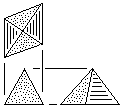 |
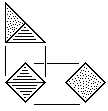 |
| R |
Right-Handed Prism Block
Three tetrahedral units.
Made from either triangular or square stock without waste. |
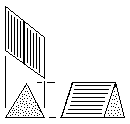 |
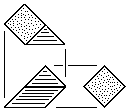 |
| L |
Left-Handed Prism Block
Three tetrahedral units.
Made from either triangular or square stock without waste. |
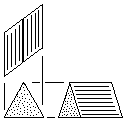 |
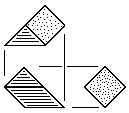 |
| O |
Squat Octahedron Block
Four tetrahedral units.
Made from square stock with waste.
Also made of two rhombic pyramid blocks. |
|
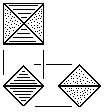 |
| C |
Six-Sided Center Block
Six tetrahedral units.
Made from square stock without waste.
Also made of two prism blocks.
See Fig. 90 for more information. |
|
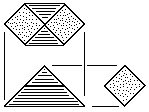 |
Fig. 112
For further clarification, Fig. 113 shows rhombic dodecahedra dissected into
these various shapes. The rhombic dodecahedron itself is used as a basic
building block in Chapter 8.
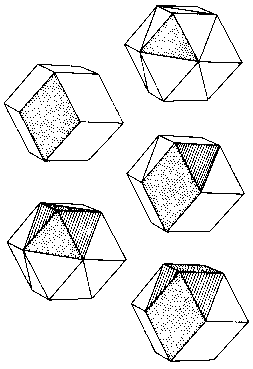
Fig. 113
With only these six building blocks, the number of simple ways in which they
can be combined into interlocking puzzles is phenomenal. Just a few more
examples will be shown in this chapter.
©1990-2005 by Stewart T. Coffin
For questions or comments regarding this site, contact the chief
metagrobologist:
 |
[Next Page] [Prev
Page] [ Next Chapter] [Prev
Chapter]










